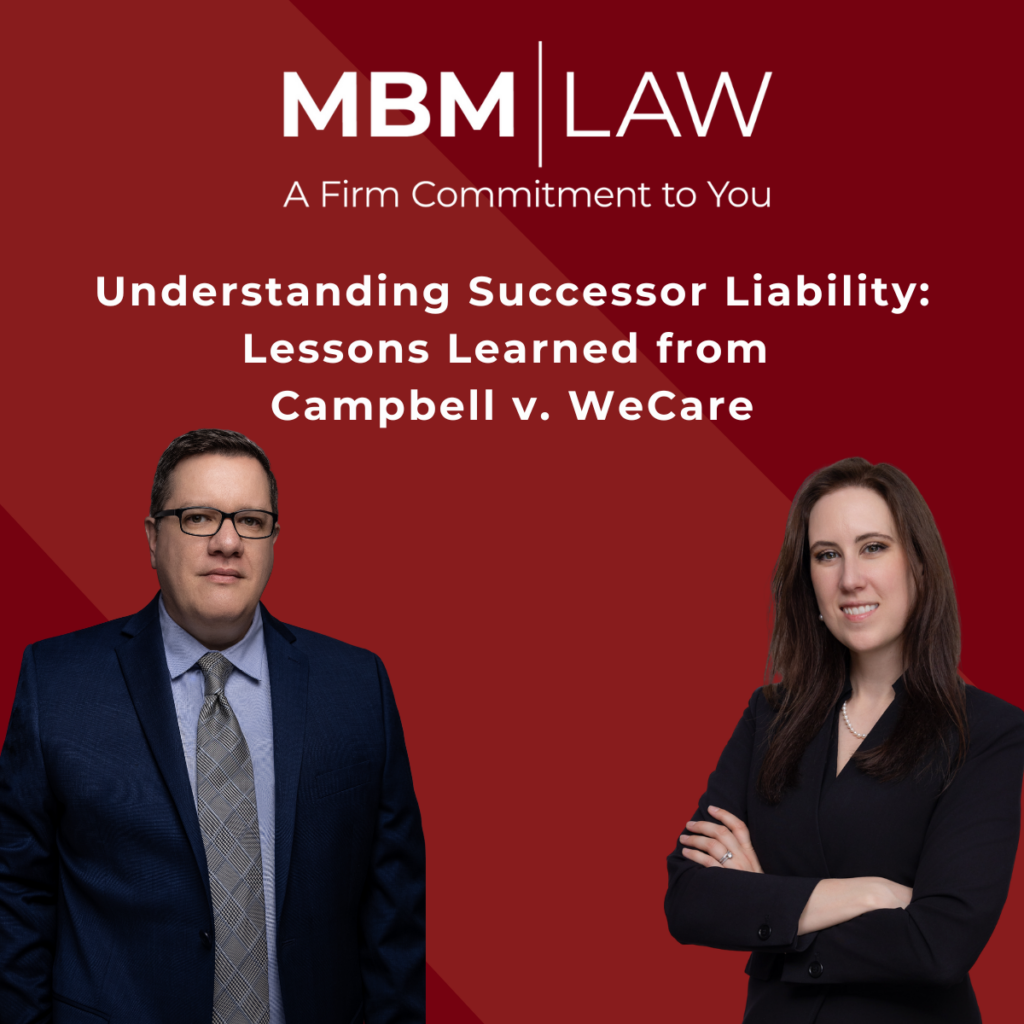written by Jason Kelley, S.J. Milliron
Businesses acquiring assets from other companies must be concerned with more than just the purchase price and the condition of the purchased assets – they must also be cognizant of potentially stepping into a web of prior liabilities. The Pennsylvania Superior Court’s decision in Campbell v. WeCare provides a critical reminder: even in asset purchases, successor liability may apply if the transaction resembles a merger. This case provides valuable insight into the potential legal pitfalls for businesses engaging in acquisitions and the importance of structuring acquisitions in a way that limits exposure to these hidden liabilities.
Protect your business from potential successor liability – reach out to our Pennsylvania business law firm for experienced guidance.
Contact MBM Law Business Lawyers
The Campbell v. WeCare Case: An Overview
Campbell, a hauling service operating under the name Campbell Crops, entered into a contract with WeCare Organics, LLC (WeCare), to haul biosolid product from June 2014 through December 2015. After rendering services, Campbell was left unpaid to the tune of $120,472. A couple of years later, in 2017, WeCare entered into an Asset Purchase Agreement (APA) with Denali Water Solutions, LLC (Denali), in which Denali purchased the majority of WeCare’s assets.
In 2019, Campbell sued both WeCare and Denali for the unpaid invoices, alleging that Denali was also liable for the debt under the theory of successor liability. Campbell argued that the transaction was not an asset purchase but rather constituted a de facto merger.
The general rule in Pennsylvania corporate law is that the purchaser of a corporation’s assets does not assume the seller’s debts. There are, however, exceptions which include a de facto merger. To determine whether a de facto merger has occurred, there is a four-prong test the court applies:
- Continuity of ownership;
- Cessation of ordinary business and dissolution of the predecessor;
- Assumption by the successor of the liabilities necessary for the uninterrupted continuation of the business of the predecessor; and/or
- Continuity of management, personnel, location, and business operations.
The trial court found Denali liable, holding that the transaction with WeCare met these criteria, and Denali appealed.
Campbell vs. WeCare: Clarifying Continuity of Ownership
At the heart of the Superior Court’s reversal was the issue of continuity of ownership. The Superior Court held that this prong requires some continuation of shareholder ownership between the selling (WeCare) and purchasing (Denali) entities. The trial court had reasoned that because the founder of WeCare, Mr. LeBlanc, received both an executive position at Denali and an option to purchase up to 1% of Denali stock, that a continuity of ownership existed.
The Superior Court found otherwise. The court reasoned that continuity of ownership exists when the selling company sells assets but also then obtains an ownership interest in the purchasing company. The appellate court explained that when assets are sold in this manner, the selling company retains the benefit of the assets transferred, but the creditors of the selling company are left without any way to collect their debt since the assets have been transferred to the purchasing company.
Ultimately, LeBlanc did not receive any actual ownership interest in Denali through the APA. The Superior Court emphasized that employment or cash payments in exchange for equity do not satisfy the continuity of ownership requirement. Accordingly, the court held that this factor was not satisfied and that the trial court erred in granting summary judgment to Campbell.
Understanding the nuances of “continuity of ownership” is crucial in Pennsylvania asset acquisitions. If you’re involved in buying or selling a business, ensure you understand the implications for successor liability. Contact our experienced business law team for clarity and guidance.
Cessation of Business and Dissolution
The Superior Court also addressed the second prong: whether WeCare ceased business and dissolved. For this element, the court explained that where the APA requires the selling company to cease operations, or in instances where the selling company has been reduced to an empty shell, that this prong is satisfied.
In the APA, WeCare was required to change its legal name, adhere to a non-compete covenant, and remain solvent. In fact, WeCare retained some contracts and remained legally active in New York and Pennsylvania. The Superior Court found that WeCare was defunct by 2020, but that the APA did not show an intent that WeCare would cease operations after the transaction, and that it was not clear precisely when WeCare became defunct. Because genuine issues of material fact remained about when and why WeCare ceased operations, the Superior Court remanded the case to the trial court for further factual determination.
Essential Due Diligence for Business Acquisitions
This case is a clear warning for both buyers and sellers in asset transactions. Buyers cannot assume they are insulated from liability simply by structuring a deal as an asset purchase. If the transaction looks and functions like a merger, courts may impose liability under the de facto merger doctrine. Clients acquiring business assets should conduct thorough due diligence and consider protective mechanisms in their asset purchase agreement – such as indemnification provisions, warranties of no outstanding liabilities, and defining the relationship of prior ownership and management. Sellers, likewise, should understand that post-sale litigation could expose them or related parties to exposure if there are liabilities that survive the sale of the assets that are not otherwise addressed. Ultimately, Campbell v. WeCare underscores that post-sale liabilities may be transferred in an asset sale and purchase transaction if the parties are not careful.
Managing Liabilities in Corporate Transactions with MBM Law
The Business Law team at MBM Law is highly experienced in structuring purchase agreements and managing liabilities during corporate transactions. Our attorneys ensure clarity in agreements to address potential risks under successor liability doctrines while conducting thorough due diligence to identify liabilities that may transfer post-acquisition.


